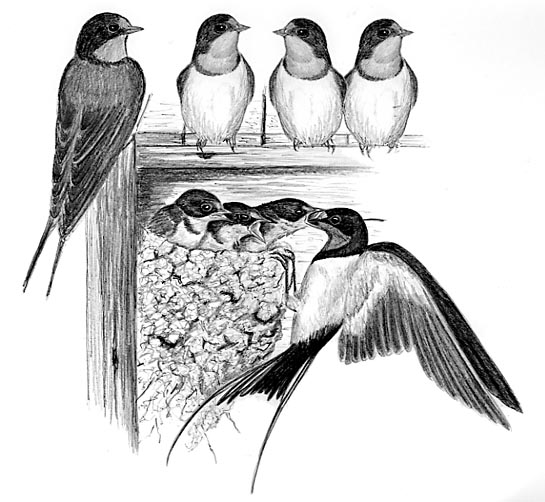
Dear Bird Folks,
We were lucky enough to have a family of Barn Swallows nest on our property this summer. They were delightful birds to watch, but oddly, instead of two swallows tending the nest, there were four or five. I was afraid these extra birds would try to steal the nest, but the parent birds didn’t seem to mind and nothing bad ever happened. Why the extra birds?
– Judy, Sudbury, MA
I messed up, Judy,
You were nice enough to stop by in person and ask me a question about your swallows. Being the professional that I am, I immediately wrote down your inquiry, along with your name and address, on an official question and answer form. In this case the official form was the back of an old paper bag that at one time contained my lunch. Everything was fine until I tried to locate the question bag later in the day. It was gone and I have no idea where it went. I either accidentally threw the bag away, or put some other customer’s merchandise in it or mistakenly ate it instead of my lunch. (I know that last possibility seems unlikely, but being a vegetarian, I could have easily eaten a used paper bag and never noticed that it wasn’t my lunch.) The good news is that I remembered your question, but I have totally forgotten your name and address. I know you aren’t Judy from Sudbury, MA, but nobody else reading this knows it, or even cares, so just play along and we’ll get through this.
It’s nice to hear that you had Barn Swallows this year. As you mentioned, they are truly delightful birds to watch, and beneficial, too. Everyone likes Barns Swallows…well, everyone except the poop paranoid people (aka the PPP). You see, these swallows like to nest in or under our buildings and the PPPs of the world often call me, all freaked out, wanting to know how to “get rid” of the swallows. They’re afraid that some of the birds’ droppings might land on the floor of their barn. OMG! Poop in a barn! Can you imagine something so terrible?
I understand why you were confused when you saw birds that weren’t the parents coming to your swallow’s nest. Typically there is trouble when any strange bird approaches an active nest, but not in this case. The mysterious swallows that showed up at your nest weren’t trying to steal it. On the contrary, they were there, believe it or not, to help. Often unmated Barn Swallows “adopt” a family and help raise the chicks. These helper birds may perform an assortment of tasks, including nest building, incubating eggs and brooding. They may help feed the chicks, too, but the experts can’t seem to agree if that really happens. The other thing they can’t agree on is what the helpers have to gain from all this extra work. Volunteer work might be fine for a Boy Scout in need of a merit badge, but nature has little time for charity work. Wild creatures rarely do anything that doesn’t benefit them directly.
Some feel that helper birds are not yet mature enough to have a family of their own, so they “play house” instead. By assisting the older birds with the daily chores the parent wannabes gain valuable life skills. Other researchers have a more sinister take on these birds. They claim the helpers, which are usually males, are only doing the extra work so they’ll be available in case something happens to the resident male. One of these birds may even hook up with the resident male’s wife, for a little action on the side, when he is out of the barn. By the way, most scientists don’t like the term “helper.” Instead, they call it “cooperative breeding.” I think helper sounds better. Cooperative breeding reminds me too much of the old days in the Soviet Union. It gives the impression that if birds don’t reproduce in a manner that satisfies the State, they’ll end up in some kind of avian Gulag.
Helper birds should not be confused with loser birds that are still hanging around their nest. Sometimes, when birds have two broods in a season, the first brood will continue to tag along with the parents, even though they are quite capable of taking care of themselves. These are not helpers because they don’t help with anything. They are just clingy, needy kids that are too lazy to help, yet are too afraid to strike out on their own. Last week a lady named Sue asked about multiple House Finches coming to a nest in her yard. (Right now Judy is thinking: “Oh sure, you remember Sue’s name, but not mine.” I’m sorry, Judy. Okay? Get over it.) Those other finches were likely clingy fledglings from an earlier brood and not helpers. House Finches are not known to participate in cooperative breeding. They hate Communism.
The use of helpers is uncommon. Fewer than ten percent of all birds breed this way. However, it must work well for Barn Swallows, as this little bird can be found on every single one of the world’s continents, except for that big, icy one at the South Pole. And hopefully, if we continue to share our barns, and if the PPPs of the world get some much-needed therapy, Barn Swallows will be with us for years to come.